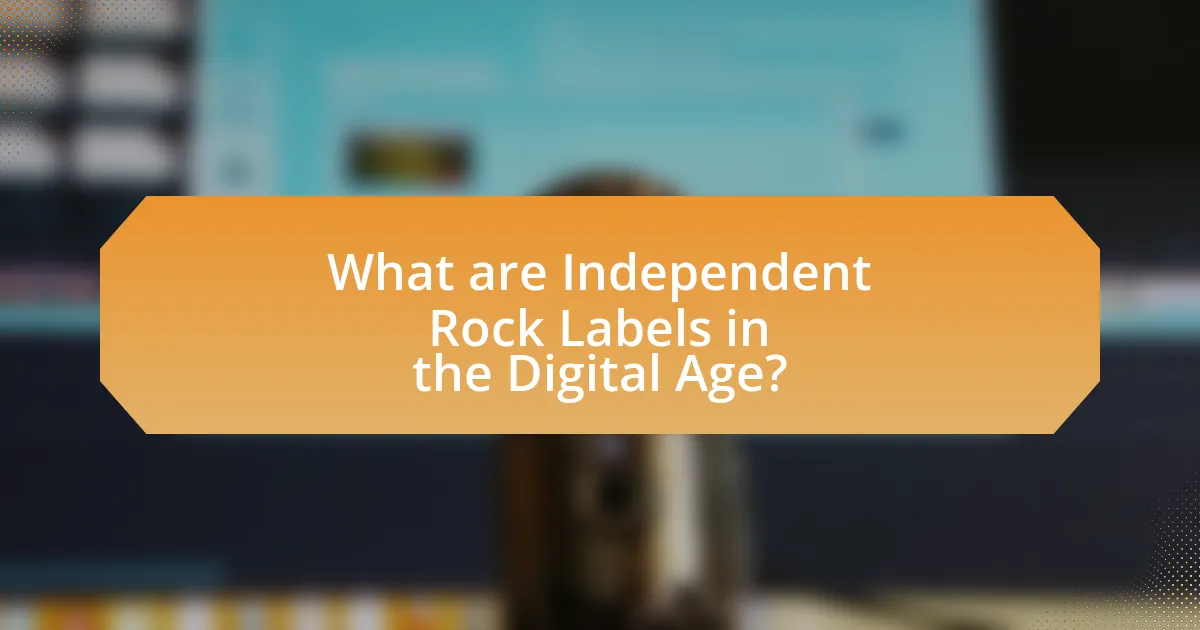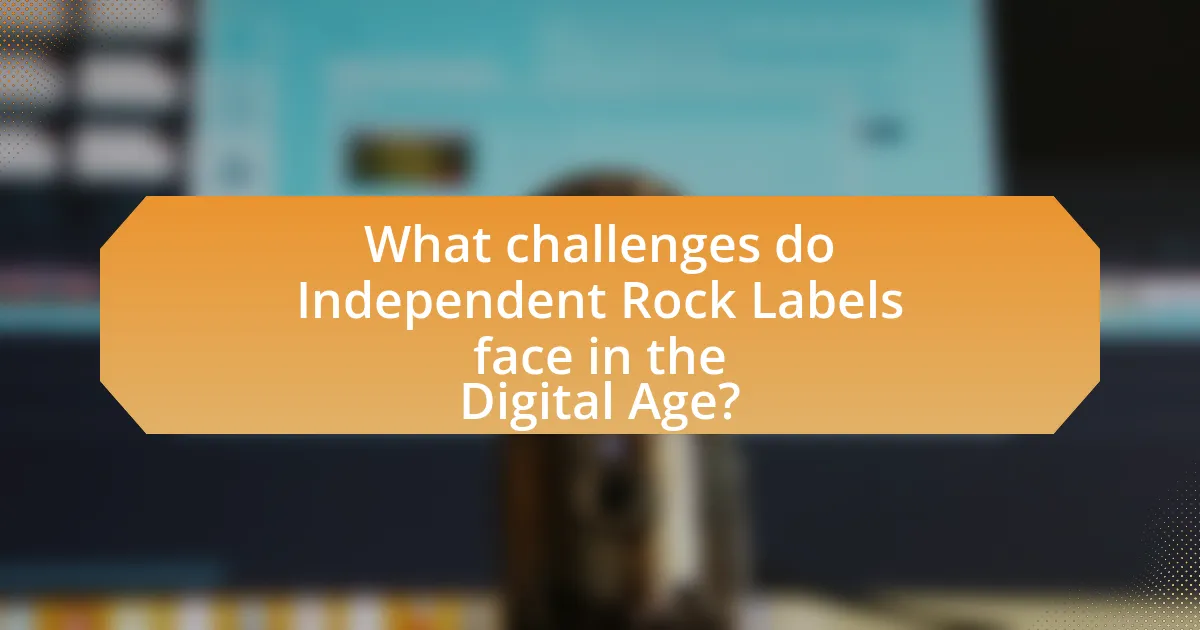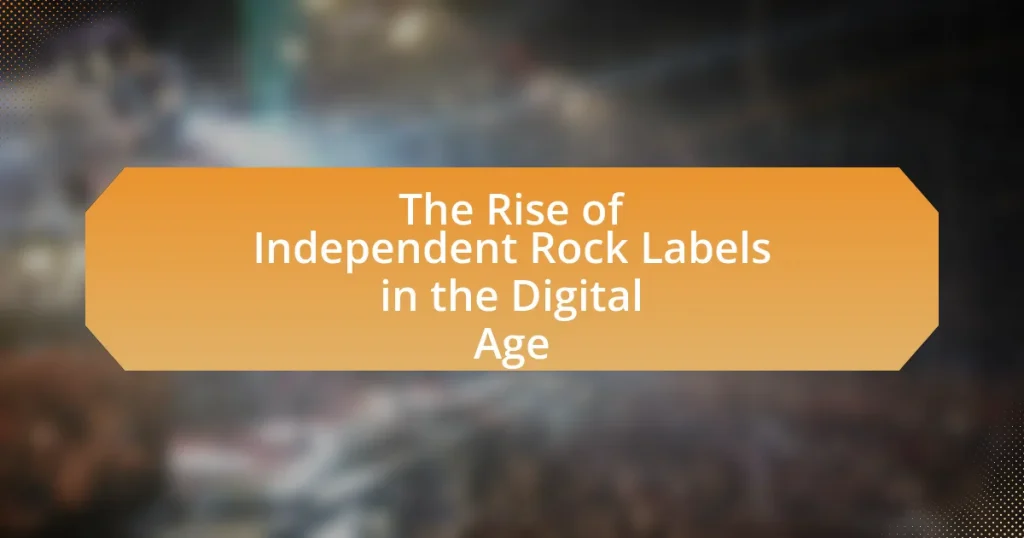Independent rock labels have emerged as significant players in the music industry during the digital age, operating outside the traditional major label system. These small, self-funded companies utilize digital platforms for distribution and marketing, allowing them to reach global audiences and maintain creative control over their artists. The article explores the evolution of independent rock labels in response to digital technology, the impact of streaming services on their revenue models, and the unique advantages they offer to artists. Additionally, it addresses the challenges faced by these labels, including financial constraints and competition from major labels, while highlighting future trends and strategies for success in a rapidly changing music landscape.

What are Independent Rock Labels in the Digital Age?
Independent rock labels in the digital age are small, self-funded music companies that produce, promote, and distribute rock music outside of the major label system. These labels leverage digital platforms for distribution, allowing them to reach global audiences without the financial backing of major corporations. The rise of streaming services and social media has enabled independent rock labels to thrive, as they can directly connect with fans and utilize data analytics to inform marketing strategies. According to a 2021 report by the International Federation of the Phonographic Industry, independent labels accounted for 40% of global recorded music revenue, highlighting their significant impact in the current music landscape.
How have independent rock labels evolved with digital technology?
Independent rock labels have evolved significantly with digital technology by leveraging online platforms for distribution, marketing, and audience engagement. The rise of streaming services like Spotify and Apple Music has enabled these labels to reach global audiences without the need for traditional physical distribution channels. Additionally, social media platforms such as Instagram and TikTok have provided independent artists with tools to promote their music directly to fans, fostering a more personal connection and allowing for grassroots marketing strategies. According to a 2021 report by the International Federation of the Phonographic Industry, independent labels accounted for 40% of global recorded music revenues, highlighting their growing influence in the digital landscape. This evolution has allowed independent rock labels to thrive by adapting to new technologies and changing consumer behaviors.
What role does technology play in the distribution of music by independent labels?
Technology plays a crucial role in the distribution of music by independent labels by enabling direct access to global audiences through digital platforms. Independent labels utilize streaming services, social media, and online marketplaces to distribute their music without the need for traditional intermediaries, significantly reducing costs and increasing reach. For instance, platforms like Bandcamp and Spotify allow independent artists to upload their music directly, facilitating immediate availability to listeners worldwide. According to a 2021 report by the International Federation of the Phonographic Industry, digital music revenues accounted for 62% of the global recorded music market, highlighting the importance of technology in the success of independent labels.
How has the internet changed the marketing strategies of independent rock labels?
The internet has transformed the marketing strategies of independent rock labels by enabling direct engagement with audiences and reducing reliance on traditional media. Independent rock labels now utilize social media platforms, streaming services, and digital marketing tools to reach fans directly, allowing for targeted promotions and real-time feedback. For instance, platforms like Bandcamp and SoundCloud facilitate the distribution of music without the need for physical sales, while social media channels like Instagram and Twitter allow labels to create a community around their artists. This shift has led to increased visibility and accessibility for independent artists, as evidenced by the rise of successful independent acts who have gained substantial followings through online marketing efforts.
Why are independent rock labels significant in today’s music industry?
Independent rock labels are significant in today’s music industry because they provide artists with creative freedom and a platform to reach niche audiences. Unlike major labels, independent labels often prioritize artistic expression over commercial viability, allowing musicians to explore diverse sounds and styles. This has led to a flourishing of unique music that resonates with specific fan bases. Additionally, independent labels have adapted to the digital age by leveraging online distribution and social media, enabling them to promote their artists effectively without the extensive resources of larger companies. According to a 2021 report by the International Federation of the Phonographic Industry, independent labels accounted for 40% of global recorded music revenue, highlighting their growing influence and importance in the industry.
What unique advantages do independent labels offer to artists?
Independent labels offer artists greater creative control and a more personalized approach to marketing and distribution. This autonomy allows artists to make artistic decisions without the constraints often imposed by major labels, fostering innovation and authenticity in their music. Additionally, independent labels typically provide a more direct revenue share, enabling artists to retain a larger percentage of their earnings compared to traditional contracts. According to a 2021 report by the Music Industry Research Association, independent artists earned 70% of their revenue from streaming, highlighting the financial benefits of working with independent labels.
How do independent labels contribute to the diversity of music genres?
Independent labels significantly enhance the diversity of music genres by promoting a wide range of artistic expressions that mainstream labels often overlook. These labels provide platforms for emerging artists, allowing them to explore unique sounds and styles without the constraints of commercial pressures. For instance, independent labels like Sub Pop and Matador have been instrumental in popularizing genres such as grunge and indie rock, showcasing artists who might not fit into mainstream categories. This has led to a richer musical landscape, as independent labels often prioritize innovation and authenticity over mass appeal, resulting in a broader spectrum of genres and subgenres.

What challenges do Independent Rock Labels face in the Digital Age?
Independent rock labels face significant challenges in the digital age, primarily due to the oversaturation of the music market and the dominance of streaming platforms. The proliferation of digital distribution has made it easier for artists to release music independently, leading to increased competition for listener attention. According to a report by the International Federation of the Phonographic Industry (IFPI), over 60,000 new tracks are uploaded to streaming services daily, making it difficult for independent labels to stand out. Additionally, independent labels often struggle with limited marketing budgets, which hampers their ability to promote their artists effectively in a crowded digital landscape. Furthermore, the revenue model of streaming services typically favors major labels, leaving independent labels with a smaller share of the profits, which complicates their financial sustainability.
How do financial constraints impact independent rock labels?
Financial constraints significantly limit the operational capabilities of independent rock labels. These limitations often result in reduced marketing budgets, which hinders their ability to promote artists effectively and reach wider audiences. For instance, a study by the Music Industry Research Association found that independent labels typically allocate only 10-15% of their revenue to marketing, compared to larger labels that can invest upwards of 30%. Consequently, independent rock labels struggle to compete in a saturated market, leading to challenges in artist development and retention.
What funding options are available for independent labels?
Independent labels can access several funding options, including grants, crowdfunding, private investments, and loans. Grants are often provided by arts councils or music industry organizations, which support independent music initiatives. Crowdfunding platforms like Kickstarter and Indiegogo allow labels to raise funds directly from fans in exchange for rewards. Private investments can come from individuals or venture capitalists interested in the music industry, while loans can be obtained from banks or credit unions, specifically designed for small businesses. According to a 2021 report by the Music Industry Research Association, independent labels that utilize a combination of these funding sources tend to have higher success rates in launching new projects.
How do independent labels manage production costs effectively?
Independent labels manage production costs effectively by utilizing digital technology and strategic partnerships. By leveraging digital distribution platforms, independent labels can reduce physical production expenses and reach a global audience without the need for traditional distribution channels. Additionally, many independent labels collaborate with freelance producers and engineers, which allows them to access high-quality production services at lower rates compared to hiring full-time staff. This approach is supported by the fact that the global music industry has seen a significant shift towards digital sales, which accounted for 62% of total revenue in 2020, highlighting the cost-saving potential of digital strategies for independent labels.
What competition do independent rock labels encounter?
Independent rock labels encounter significant competition from major record labels, digital streaming platforms, and other independent labels. Major record labels dominate the market with extensive resources, marketing power, and established artist rosters, making it challenging for independent labels to gain visibility. Digital streaming platforms, such as Spotify and Apple Music, also pose competition by controlling music distribution and influencing listener preferences, often favoring mainstream artists. Additionally, other independent labels compete for the same niche audiences, leading to a crowded marketplace where differentiation becomes crucial for success.
How do major labels influence the market for independent labels?
Major labels influence the market for independent labels primarily through their control over distribution channels and marketing resources. This dominance allows major labels to dictate trends and consumer preferences, often overshadowing independent labels that lack similar financial backing. For instance, major labels can secure prime placements on streaming platforms and radio, which significantly increases visibility for their artists while making it challenging for independent labels to compete. Additionally, major labels often engage in exclusive partnerships with platforms, further limiting the reach of independent labels. According to a 2021 report by the International Federation of the Phonographic Industry, major labels accounted for 70% of global recorded music revenue, illustrating their substantial market power and the challenges faced by independent labels in gaining market share.
What strategies do independent labels use to differentiate themselves?
Independent labels differentiate themselves through unique branding, niche marketing, and artist development. By establishing a distinct brand identity, these labels create a recognizable image that resonates with specific audiences, often focusing on particular genres or subcultures. Niche marketing allows independent labels to target underserved markets, leveraging social media and grassroots campaigns to reach dedicated fan bases. Furthermore, independent labels prioritize artist development, providing personalized support and creative freedom, which fosters loyalty and innovation. This approach contrasts with major labels, which often prioritize commercial viability over artistic expression.

What are the Future Trends for Independent Rock Labels?
Future trends for independent rock labels include increased reliance on digital platforms for distribution and marketing, a focus on niche audiences, and the integration of data analytics to inform decision-making. As streaming services dominate music consumption, independent labels are leveraging platforms like Spotify and Bandcamp to reach listeners directly, bypassing traditional distribution channels. Additionally, the rise of social media allows these labels to cultivate dedicated fan bases, enabling targeted marketing strategies that resonate with specific demographics. Data analytics tools are increasingly being used to track listener behavior and preferences, allowing independent labels to tailor their offerings and promotional efforts effectively. This shift towards digital engagement and data-driven strategies is essential for independent rock labels to thrive in a competitive landscape.
How is the rise of streaming services affecting independent rock labels?
The rise of streaming services is significantly impacting independent rock labels by altering their revenue models and marketing strategies. Independent rock labels are experiencing a decline in physical sales, as streaming platforms dominate music consumption, leading to reduced income from traditional album sales. According to a report by the Recording Industry Association of America (RIAA), streaming accounted for 83% of the U.S. music industry’s revenue in 2022, highlighting the shift in consumer behavior.
Additionally, independent labels are compelled to adapt by leveraging digital marketing and social media to reach audiences, as streaming services provide a platform for wider exposure. However, the challenge remains that streaming payouts are often lower than traditional sales, which can strain the financial viability of smaller labels. This dual effect of increased exposure coupled with reduced revenue underscores the complex relationship between independent rock labels and the rise of streaming services.
What opportunities do streaming platforms provide for independent artists?
Streaming platforms provide independent artists with significant opportunities for exposure, distribution, and revenue generation. These platforms enable artists to reach global audiences without the need for traditional record label support, allowing for direct engagement with fans. For instance, Spotify reported that over 60,000 new tracks are uploaded daily, showcasing the vast potential for independent artists to be discovered. Additionally, platforms like Bandcamp allow artists to sell their music directly to consumers, retaining a larger share of profits compared to traditional sales methods. This democratization of music distribution empowers independent artists to build their careers on their terms, leveraging data analytics provided by these platforms to tailor their marketing strategies effectively.
How can independent labels leverage data analytics for growth?
Independent labels can leverage data analytics for growth by utilizing insights from streaming platforms, social media, and audience demographics to inform marketing strategies and artist development. By analyzing listener behavior and engagement metrics, independent labels can identify trends, optimize promotional efforts, and tailor content to meet audience preferences. For instance, a report from MIDiA Research indicates that data-driven decision-making can increase revenue by up to 30% for independent labels, demonstrating the tangible benefits of employing analytics in their operations.
What role do social media and online communities play in the success of independent rock labels?
Social media and online communities are crucial for the success of independent rock labels as they provide platforms for direct engagement with fans and facilitate music discovery. These digital spaces enable independent labels to promote their artists, share new releases, and build a loyal fanbase without the need for traditional marketing budgets. For instance, a study by the International Federation of the Phonographic Industry (IFPI) in 2021 highlighted that 70% of music listeners discover new music through social media platforms. This statistic underscores the effectiveness of social media in reaching wider audiences and enhancing visibility for independent rock labels. Additionally, online communities foster a sense of belonging among fans, encouraging them to support artists through merchandise purchases and concert attendance, which directly contributes to the financial sustainability of these labels.
How can independent labels effectively use social media for promotion?
Independent labels can effectively use social media for promotion by creating engaging content that resonates with their target audience. This involves utilizing platforms like Instagram, Facebook, and Twitter to share behind-the-scenes footage, artist interviews, and live performances, which fosters a personal connection with fans. According to a 2021 report by the International Federation of the Phonographic Industry, 75% of music consumers engage with artists on social media, highlighting its importance in building a loyal fanbase. Additionally, independent labels can leverage targeted advertising and analytics tools provided by these platforms to reach specific demographics, ensuring their promotional efforts are both efficient and impactful.
What are the best practices for building an online community around an independent label?
To build an online community around an independent label, focus on engaging content, consistent communication, and fostering relationships. Engaging content includes sharing behind-the-scenes footage, artist interviews, and exclusive releases, which can attract and retain fans. Consistent communication through social media platforms and newsletters keeps the community informed and involved, enhancing loyalty. Fostering relationships involves actively responding to fan interactions and creating opportunities for fans to connect with each other, such as virtual events or forums. These practices are supported by studies showing that community engagement increases brand loyalty and fan retention, essential for independent labels in a competitive digital landscape.
What practical steps can independent rock labels take to thrive in the digital age?
Independent rock labels can thrive in the digital age by leveraging digital distribution platforms, engaging with audiences on social media, and utilizing data analytics to inform marketing strategies. Digital distribution platforms like Spotify and Bandcamp allow labels to reach global audiences without the need for physical distribution, significantly increasing their market reach. Engaging with audiences on social media platforms such as Instagram and TikTok fosters community and promotes artist visibility, which is crucial for independent labels. Additionally, using data analytics tools enables labels to track listener behavior and preferences, allowing for targeted marketing campaigns that can enhance fan engagement and drive sales. These steps are supported by the fact that independent labels have seen a 30% increase in revenue from digital sales over the past five years, indicating the effectiveness of these strategies.


